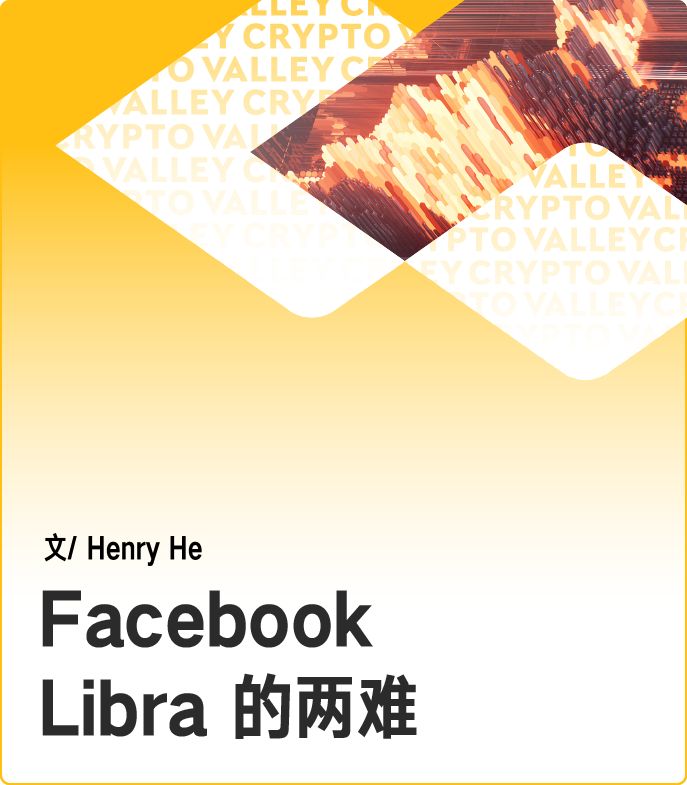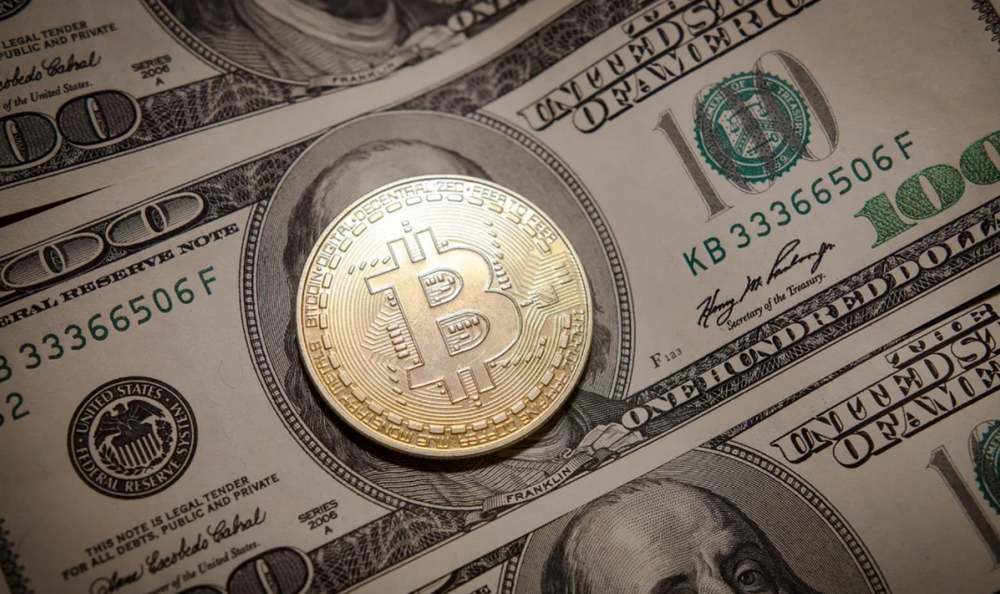Will Facebook and Libra fight with each other?

This article is compiled exclusively by Encrypted Valley .

On June 18th, social giant Facebook officially released Libra's white paper on its digital assets, which caused the industry to shake the same time, and pushed the traditional financial and encryption industry to the forefront of the storm, becoming the current "storm eye."
- Market Analysis: Will Wall Street approve ETH futures, will it lead the coin to set sail?
- Viewpoints | Some "malicious" speculations on how Facebook promotes Libra
- The Internet is developing like this, blockchain?
For the digital asset community, this is a good thing. Because Facebook's involvement will provide free market education for a large number of non-digital asset consumers, so that they can understand the field more, and perhaps expand the scale of the digital asset community in a short time.
Market education and consumer perceptions are costly, and Facebook has become one of the few organizations that can take on this responsibility because of its large user base.
Libra blockchain and Libra asset savings have been validated in the market for the three main components of the digital asset program. For example, there are both blockchain Stella based on Byzantine fault tolerance mechanism and stable currency anchored by USDC.
But unfortunately, the Libra Association, the third component of Libra, has not yet proven its viability as a governance mechanism for its blockchain.
Will this governance mechanism become the Achilles heel of Libra? I hope not, but I find that there is at least one potential problem, that is, the source of funding for the governance association.
By analyzing Libra's white paper, I found that there is a weakness in current design: if some malicious organizations choose to suppress the long-term funding of the Libra Association, it will greatly undermine its stability.
For the sake of discussion, I will share a hypothetical attack here, hoping to help the Libra team improve its design.
- Stable currency
Libra has been defined as a stable currency since its inception. I am very interested in the topic of Stabilizing Coins, because it is an important driving force for the success of Commerce 3.0, and it also means the opening of the next business era.
But in order for the stable currency to become the "Holy Grail" of digital assets, it needs to be able to withstand various attacks, including speculative attacks (Soros attacks) and price war attacks while maintaining its own stability.
When evaluating a stable currency, most people are only concerned about how to maintain stability. Few people analyze other important factors: for example, the stability of the organization behind the stable currency, the source of funding for the project, and the incentives for project investors. Return.
If the organization behind the stable currency is forced to close down due to lack of funds, can the stable currency maintain its stability in the long run? I do not think so.
In fact, not only stable currencies, but also legal tender currencies. In order to maintain its "independence from government stability," the Fed does not accept funds approved by the president or Congress. The organization’s income is protected by law, mainly from interest on government securities it holds. In 2016, the Fed received interest income of approximately $11.11 billion, while operating expenses were approximately $4 billion. From the perspective of accounting ledgers, it is profitable.
Interestingly, according to documents describing Libra's asset reserves, Libra's long-term funding will come from interest generated by Libra's asset reserves. Although not explicitly stated, I suspect that the short-term funding of the Libra Association will come from Facebook itself, or $10 million in admission fees from the founding members, or both.
The Libr white paper states: “The income from interest will be used first for the association’s operating expenses – to fund the development of the ecosystem, to provide funding for non-profit organizations and other multilateral organizations, and to conduct engineering research.”
At present, however, the interest generated from Libra savings funds and the funds provided by the Libra Association are easily suppressed, which may affect the stability of Libra's global currency system.
- Arbitrage attack on Libra reserve
Ultimately, we believe that most of Libra's asset reserves will come from its users, not the founding members of the initial investment phase. However, in the current design, Libra users are not able to profit from the interest on the asset reserve.
To boost user confidence, Libra will achieve strong liquidity, which allows users to purchase and sell Libra digital assets at any time near the reserve. Libra's two qualities (no return and strong liquidity) give users no reason to hold Libra. As a result, people will have the opportunity to attack Libra, which will suppress the asset reserve price held by the Libra Association, and the resulting interest will be reduced.
This type of attack is legal, profitable, and likely to be dominated by Libra's competitors. Let us take the example of traditional bank giant JP Morgan Chase.
To execute the attack, JPMorgan can add Libra's wallet functionality to its existing mobile banking and online applications. At first, the company will give users some small favors, so that they can actively use the Libra wallet in the JPMorgan app. Once Libra is received from the user, JPMorgan Chase can immediately sell it to the Libra Association for cash and earn interest at the same risk by purchasing the same basket of assets selected from Libra Reserve.
When users need to use Libra, JPMorgan can be purchased immediately from the market. JPMorgan Chase will always be profitable as long as the interest earned from the reserves is greater than the interest paid to the user.
Fundamentally, JPMorgan used arbitrage to earn extra money and attacked its rival Libra by driving down interest on reserves.
In addition to traditional banks, other digital asset wallets can also make money through this arbitrage. Facebook's own Calibra wallet can do the same. In this way, Facebook will play with each other's hands, which can only be done in the traditional Chinese martial arts world.
- How to resist?
Libra did not have a traditional bank on the original list of 27 founding members, and we were unable to know why. Whether Facebook can compete with traditional banks remains to be discussed, but banks will definitely fight back.
If the above attack is really implemented, how should Libra resist? This problem is very tricky.
Limiting liquidity does not seem to be a good idea because it can cause users to lose confidence in Libra. And letting Libra users get savings interest will also increase Libra's complexity, because its long-term goal is to achieve decentralization. Therefore, these basic designs should not be changed.
If the interest earned from the reserve is not sufficient to cover the expenditure, then a new source of funding should be added to the system. SWIFT's membership fee is a great example.
Managing a derivative organization of a large company is not an easy task, but I believe that Libra and its founding members will address these issues in the future.

Henry He author
Translation of Potter Li
Source: Encrypted Valley
The content is for reference only, not as an investment recommendation.
Copyright is strictly prohibited without permission
We will continue to update Blocking; if you have any questions or suggestions, please contact us!
Was this article helpful?
93 out of 132 found this helpful
Related articles
- Where is the paradise of cryptocurrencies? Count the 7 countries that are tax-free for cryptocurrencies!
- The Canadian version of the Mentougou incident re-exploded: the founder’s “death” was transferred to the personal account of the rival exchange.
- Market Analysis: BTC has signs of stabilizing and rebounding, waiting patiently for direction signals
- The bitcoin price fluctuations that you think are actually giving the futures a "replenishment difference"
- It is possible to reduce production by 10 times in two years, CME will launch Ethereum futures, and ETH will welcome two pounds at night!
- Xiao Lei: The United States prevents Facebook from issuing coins, and challenging US dollar hegemony will trigger a global currency war.
- In recent years, the "blockchain" has become a hot option for college entrance examinations. Please accept this report guide.






